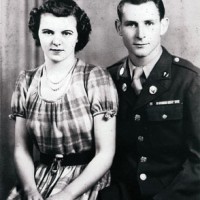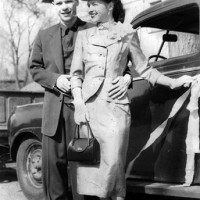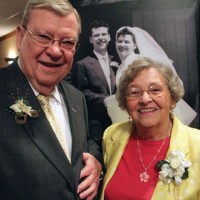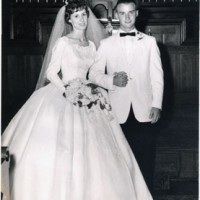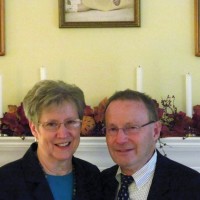‘They say that falling in love is wonderful; wonderful, so they say’ The recipe for long-term marital success starts with love but other ingredients just as important
"To keep your marriage brimming
With love in the marriage cup,
Whenever you're wrong, admit it,
Whenever you're right, shut up."
~ Nash
There was a time when living to 100 was enough of a rarity that it was news. The same was true for couples reaching their golden anniversary or beyond.
The reason these accomplishments were rare was because people didn’t stay healthy enough to live to 100 or to reach 50 years or more of marriage. According to the Centers for Disease Control the average life expectancy in the United States increased more than 30 percent during the 20th century; the number of people 100 years old or more has more than doubled the last 25 years.
The reasons for that, of course, are improvements in medicine along with better diet and more exercise.
But has the number of marriages reaching 50 or more years kept pace, statistically speaking? That’s a tough question to answer because of the many factors involved. For example, the U.S. Census Bureau reports people are waiting to marry until a later age than ever before and more couples choose to live together without marriage.
The Census Bureau further reports that about 5 percent of all marriages reach 50 years or more, but the chances are that will increase as time goes on because, again, we’re living longer. And while it is true the divorce rate is much higher than it was 50 years ago, that has started to change over the past 20 years.
Still, there is little question that reaching 50 years of marriage or more is still a rarity. The secrets to longevity vary per couple, but there are some common ones. They include respecting each other, trying never to go to bed angry with one another, being of strong faith and being able to say the magic words, “I’m sorry.”
The Peorian interviewed three couples for this issue that have long marriages in common. All reached milestones within the past year. Let’s meet them.
Tom and Viola Conroy
“Long engagements give
people the opportunity of
finding out each other’s
character before marriage,
which is never advisable.”
The above quote is from the well-known Oscar Wilde comedy, “The Importance of Being Ernest.” Its inclusion here is not meant to necessarily imply that the short engagement the Conroys enjoyed before they married Aug. 1, 1942 — 70 years ago — kept them together.
The wedding came when the couple, who met in Syracuse, N.Y., had known each other only three months. He was 20 years old, in the U.S. Air Force, when he was stationed in Syracuse and met Viola Button, who was 17 and living at home with her father.
“Soldiers were always looking for girls, you know. But she was special and I knew it right away,” Tom said while sitting near Viola in their Pekin home. “People said we were too young and shouldn’t do it, but we were stubborn, you know. We stuck with it.”
The young couple and young marriage survived Tom’s deployment overseas; it was, after all, World War II. He was gone 28 months, spending time in China, Burma and India. Viola came to central Illinois to live with Tom’s mother and wait for him to come home. She wrote him every day.
The courtship, whirlwind by today’s standards, ended with a simple proposal, Viola said. “Yes, he called me on a Wednesday night and said, ‘we’re getting married on Saturday.’ I said, ‘Are we?’ That was how I accepted,” she said, smiling at the memory.
Added Tom, “I just thought it seemed like a good idea. It may not have been all that romantic, but I’d say it’s worked out pretty good for us even though we really didn’t know each other very well. We’re still working at it, though. I don’t think we ever had thoughts about whether it would last. Oh, we had our spats like everybody else but we worked through them.”
Viola said the determination to do that came from another common ground they shared. “I think we were meant for each other because we both came from broken homes. We knew we were going to work hard at it because of that,” she said.
Another factor was that both came from families with 10 children. They decided early in their marriage to have only two children and thus be better able to support the family.
Tom was adopted, as well. He and his siblings were separated at a young age and he spent several years living at Boys Town in Omaha, Neb. He knew Father Flanagan, the Boys Town founder, and recalls the first time meeting him, when he was still frightened about what was going to happen to him.
“Father Flanagan, he pats me on the head and says, ‘Kelly, you don’t have to be afraid here. We’ll take care of you.’ And they did.” Kelly is Tom’s middle name.
Viola also had a tough childhood. Her mother left the family when she was 10. She lived in Syracuse until she married Tom.
Tom came to central Illinois after his adoption; his adopted mother was from Armington and he lived in Bloomington during high school. He and Viola moved to Pekin after he went to work at Caterpillar Inc., starting as a floor sweeper and working his way up to a supervisor before he retired.
Viola became a homemaker after the children were born.
Tom also dabbled in local township politics before he retired and the Conroys moved to Florida, where they lived 16 years before coming back. Their children, Tom Jr. and Nadine, both live in Pekin and wanted their parents to return. There were health issues, they said.
In discussing their long marriage, the Conroys agreed having patience with one another was important early because they really knew little about each other. “We learned to give and take. I think all couples have to learn that,” Viola said.
Tom said listening to each other also is key. “Sometimes men try to lord it over on the ladies. That isn’t right. I always try to put her first because she gave up a lot for me. I don’t mind being second. You know, she was a very gentle person with a wonderful sense of humor when we met and that’s still her today. She has been everything a man could want in a wife,” he said.
Each said there have been no regrets through the 70 years. “We honor one another pretty evenly, I think,” Viola said. “We’ve been happy together. We’ve been consoling to each other in times of tragedy. We’ve leaned on each other when we needed support. We learned to say ‘I’m sorry.’”
Tom said Viola remains the light of his life. “She’s my spark. She keeps me ignited. Love will cover a lot of things, including discord, when you are determined to work at it,” he said.
Vic and Pat Burnett
“A long marriage is two people
trying to dance a duet and two
solos at the same time.”
~ Anne Taylor Fleming
For 60 years Vic and Pat Burnett have been making music, but it has been much more than competing solos or just a duet. They created an entire ensemble that has been playing the Burnett Family Anthem like a finely tuned orchestra.
In the case of this devoutly Catholic family, the music angle is more than a metaphor. It was what brought Vic and Pat together — their first date was to the Muny Opera in St. Louis, a double date with Pat’s sister and the St. Louis man she married —and ultimately led to their April 19, 1952 wedding.
“Our love of music brought us together, really. It was why Pat’s sister thought we should meet. So you see, music was a big, big part of our relationship from the very start. And, naturally, we passed our love of music on to our children,” Vic said during a recent interview in their Peoria home.
Vic was a singer, Pat a musician and their children all have been both. There were 11 children born to this marriage, including a son, Patrick, who died only an hour and a half after his birth.
Their oldest child, Marc Burnett, died in September last year, just four months after he was diagnosed with pancreatic cancer. His illness and death were very difficult for the entire family, but the cohesiveness of the Burnett family was what got them through it, Pat said.
“It’s really, really hard. Everybody says Marc is in a better place now. Well, I’m not. The big ‘why’ question has come into play often. When Patrick died, I was devastated. But we had Marc for almost 60 years. I know we’re not the first parents to lose a child, but we have to deal with the pain, the anger and the depression and we have to deal with it day by day. The family support, especially our kids supporting each other, has been the best thing to help us through it,” she said.
Added Vic, “Those children of ours, they choose to be together on a regular basis in good times. Then when bad times come, that same closeness applies. We’re maintaining, all of us. Life does go on.”
Vic and Pat chose to have a large family and it wasn’t always easy, Vic said. “But they came up in a happy home. They always had enough to eat and got the necessities, even when things were tough. I remember one time when we could barely afford a loaf of bread so Pat baked a loaf. It was so good one of the kids remarked that we should be broke more often,” he said with a chuckle.
Vic is a native of St. Louis, a graduate of St. Mary’s High School who sang in an archdiocesan boys choir that performed on a national radio program.
Pat was born in Davenport, Iowa, the daughter of a grocery store owner who helped shape her own musical talents. When they married Vic was in the Air Force (their two oldest children were born at Scott Air Force Base) and he later went to Iowa State University to get a degree in radio and TV and in theatre art, a double major. While there, nearing graduation, he first heard of Peoria when a professor arranged for him to get an interview as a producer-director for WEEK. He got the job; it was spring, 1959.
Said Pat, “Here we are, Vic is getting ready to finally graduate and I’m thinking we’d be going to places like Savannah or Denver or even Hawaii, places where we knew there were jobs. When he came home and said he got a job in Peoria, I said, ‘where’s Peoria?’ But, we have come to love Peoria. It’s our home.”
While at WEEK Vic produced commercials, had a stint directing the Captain Jinks Show and produced the news, weather and sports. He became a local personality himself when he became the full-time weatherman when Bill Houlihan left the business. It was supposed to be an interim gig until a permananet replacement was found; it ended up being 14 years. “And not once did they tell me ‘you got the job.’”
When Houlihan returned, Vic was promoted into management — and into a job he didn’t like. He quit and spent some time doing “a lot of things” to earn a paycheck until he landed a radio job in Springfield in 1986. He stayed there 10 years before returning to a job at WHOI-TV. He and Pat returned to Peoria, but they felt they never really left. “Peoria had become our home by then. We were up here all the time anyway and we always knew we’d be coming back here.”
They now spend a lot of time with their children and their 16 grandchildren. They impart the importance of family to the grandchildren in the same way they did their children.
Pat told how she and Vic once went to a communications workshop in St. Louis and talked about the fact the children were getting older, that it wouldn’t be long before the older ones would be going away to college and to live their own lives. “We decided to take a family vacation. We got a motor home and a couple of tents and took off. That trip had such a positive impact on our lives. We learned how important it was that we talk and communicate with each other,” she said.
Vic agreed. “The best way to communicate is to report your feelings to the other. It’s a good thing to do. So often we don’t do that and we make judgements that are hurtful. So communication, sharing feelings, is very important for a long marriage,” he said.
Pat said she believes the keys to their successful marriage include friendship, communication, respect and giving each other the freedom to express themselves or do what they need to do to be happy. She cited Vic’s love of participating in community theatre as an example. “He has to do it and I have to let him,” she said. “And he has been very supportive of me when I have needed to do something.”
That, she said, is part of the give-and-take every marriage needs. “It takes that as well as maturity and selflessness,” she said.
Vic said people contemplating marriage should “look for bridges. When you are interested in someone, look for things that connect you, whether it is music or something else. But make sure friendship is the first bridge. Then you make sure you don’t burn those bridges because you never know when you are going to need them to cross the river again.”
Jim and Jeanette Pritchard
“The bonds of matrimony are
like any other bonds - they
mature slowly.”
~ Peter De Vries
For more than seven years Jim and Jeanette Pritchard had an on again-off again relationship, dancing around the issue of making it permanent since they first went on a date while both were students at tiny Wyoming High School.
Yet, so much had become assumed by then that when it came time for Jim to pop the question, he really didn’t have to. “We went up to Kewanee one day and we were just walking around and we ended up at a jewelry store. It was just kind of assumed by everybody at that point that we were going to get married. We just picked out the rings and went from there,” Jeanette said while sitting with Jim in their Washington home.
Soon thereafter, on Aug. 5, 1962, they were married at the Congregational Church in Wyoming. “We were high school sweethearts. It just took us a while before we got married,” she said.
The wedding reception was in the high school gymnasium. The honeymoon was a road trip in their 1957 Chevy. “Those were simpler times, no question,” Jim said.
They were always simple, as in easy, however. Jeanette taught home economics, first in Tremont and then at Washington High School, while Jim worked for Hyster Co. and then for Caterpillar, until 1982 when he lost his job along with thousands of others when Caterpillar went through a considerable restructuring and downsizing.
By then, three children had been born to the marriage and the economy had gone sour. Jim didn’t find work quickly.
But also by then, Jeanette had left the teaching profession and was selling real estate for WRC Inc. in Washington. She had earned a reputation and even though the economy was down and houses were selling well, she did ok. Well enough to keep the family going while Jim was out of work.
“Those were tough times, especially for people directly involved in the downturn. I had been doing well but at the same time we didn’t know what was going to happen in the real estate industry. Interest rates were 15 percent to 18 percent, people were losing their jobs and leaving the area. Still, when Jim lost his job it wasn’t difficult as far as our marriage went. I just worked harder,” Jeanette said.
Eventually, Jim got his real estate license also and the Pritchards became partners in a different way, both working at WRC. “It was quite a change for me, I’ll admit that. Up until I got into real estate I’d always worked with my hands,” he said.
Yet Jeanette thinks he was born for the business. “Real estate is a people business and I don’t think you could find much more of a people person than Jim. He knows how to build commitments with people, which is essential in this business. We’ve really had no problems working together. In fact, Jim is the easiest person to work with. Even at home because he does all the things I don’t want to do. So it works out,” she said.
“Well, yeah,” chimed in Jim. “But I wasn’t always as good a partner as I am now. I’ve mellowed and I help out around the house more.”
Sharing and helping each other are among the keys to their successful marriage, the Pritchards agreed. Being there for each other has helped when they needed to be there for others, including their children.
Tragedy, Jeanette said, has a way of making what used to be considered difficult seem less of a problem, she said. “Nothing really is as difficult as losing a child or a grandchild. That is probably the most difficult thing we’ve gone through,” she said, referring to the death of their grandson Sam who died of spina bifida at age 2.
“It is not just your pain you are dealing with, but also the pain for and of your children. You don’t like to ever see your children suffer and you want to do anything you can to help them get through it but it is very difficult,” she said. “You know, we always tried to put the children first, go to all the functions and attend to their needs. But your involvement with your children and your family never stops just because they get older. A parent is always, always on call.”
Their faith was helpful during that struggle and it has been another key to the success of their marriage. “We agreed early on we would raise the children in a church-based family and we have. We’re not really material-minded people but our faith is very important to us,” Jeanette said.
Jim said faith and having good friends has helped him and Jeanette to keep their friendship with each other strong, helping solidify their partnership. “I mean, we argue like everyone else does, but in the end we always know the other is going to be there.”
“It goes back to commitment,” Jeanette said. “We just never thought there was any other option but to be together. Would I do anything different? That’s a difficult question because it is circumstances that cause you to do the things you do. But I don’t think I would.”
Jim said affection for each other has never waned, “but they have grown in ways you don’t expect. We still love each other, more and more.”


